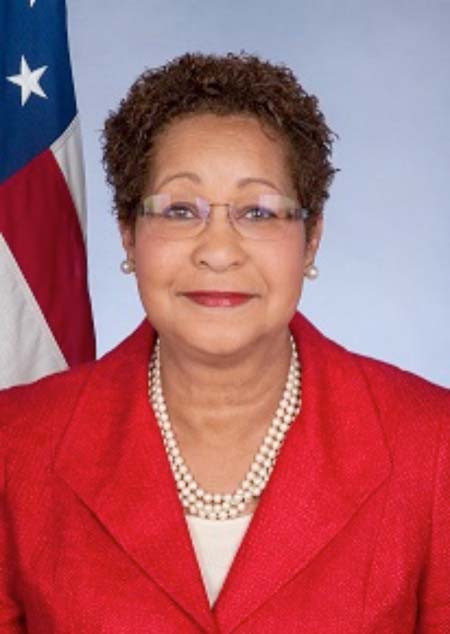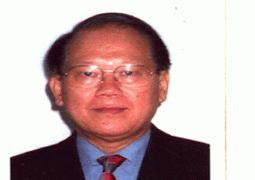
The United States Ambassador to The Gambia, Patricia Alsup, yesterday said “the US calls for the immediate release of those individuals and journalists imprisoned for doing their job,” as she and her embassy joined the rest of the world to commemorate World Press Freedom Day May 3rd, 2016.
She made this call at a commemorative programme on World Press Freedom Day held yesterday at the American Corner in the Comium Building on Kairaba Avenue.
The programme was graced by members of the media fraternity in The Gambia, as well as students from the UTG School of Journalism and Digital Media and other journalism institutions in the country.
Speaking on the occasion, Patricia Alsup said: “We will continue to speak out when journalists are unfairly arrested and detained; we will continue to raise these issues with foreign affairs officials at every level; and we will continue to promote journalists’ physical and digital safety.
“Freedom of expression is one of our country’s core values and one which we will continue to defend both at home and overseas.”
She quoted the U.S. Ambassador to the United Nations, Samantha Power, who said: “When media and journalists are silenced, the people’s voices go silent; accountability erodes, putting democratic governance and other rights and freedoms at risk.”
She added: “Every year, as you all know, World Press Freedom Day is observed globally on May 3rd to honour journalists around the world who defend democratic ideals through their commitment to discovering and telling the truth.
“Today, we pay tribute to journalism itself, a profession that is essential to good governance and the functioning democracy.”
This is a critically important time to acknowledge the contributions of journalists to a just and fair world, she continued, adding: “From violent extremists and criminal gangs who abduct and kill reporters to authoritarian governments that persecute them, press freedom is under attack.”
Freedom of expression is a fundamental right that is enshrined in both the Universal Declaration of Human Rights and the U.S. Constitution, she went on.
“This right clearly emphasizes that everyone has the right to seek, receive, and impart information and ideas through any media and regardless of frontiers,” the US Ambassador said, adding that all governments have a commitment to uphold this fundamental freedom, which includes press freedom.
Alsup stated that restrictions on journalists often run counter to freedom of expression.
Journalists and other members of the media (such as editors and publishers) should be able to freely investigate, research, publish, and disseminate news, information and opinions both online and offline without fear of reprisals.
She further stated that governments are responsible for protecting journalists from physical harm and intimidation, and when journalists are the victims of crimes, governments are responsible for investigating those crimes and bringing the perpetrators to justice.
“That is the very reason why the defence of a free press is central to the work of the U.S. Government’s promotion of human rights. That’s why we speak out and condemn violations of press freedom and attack on journalists who are only doing the job society has asked them to do to discover and tell the truth.”
She added that the United States’ commitment to these challenges faced by the press and journalists “is unwavering”.
“We work to advance media freedom around the world through bilateral engagement, public diplomacy, programming and multilateral diplomacy.
“I am pleased to inform you all that the U.S. Department of State just launched its fifth annual “free the press” campaign on Monday, April 25th. This social media campaign is part of our efforts marking the importance of a free and independent media.
“This campaign highlights symbolic cases of journalists and media outlets around the world who were censored, attacked, threatened, imprisoned, or otherwise oppressed because of their reporting, and whose situations have not yet improved. The cases are being profiled on a daily basis on www.HumanRights.gov and they are being tweeted out using the hashtag #freethepress,” she said.
She added that the available statistics on the state of journalism around the world today painted a shocking picture.
In the past ten years, 370 journalists were murdered and in 90% of cases “there were no convictions”.
In 2015 alone, 71 journalists were murdered globally and additional 199 were jailed in prisons around the world.
Additionally, 452 journalists including Gambians have been forced into exile since 2010, and these figures tell “just how dangerous the noble profession of journalism really is,” according to the US diplomat.
“On the ground here in The Gambia, my embassy continues to engage key actors including the government and civil society, to address fundamental issues of freedom of the press.
“We acknowledge that the Gambian media environment needs to improve so that a freer and more vibrant industry may thrive. Self-censorship due to fear of repercussions continues to be a stain on the practice of Gambian Journalism. This status quo affects the quality, the standards, and the credibility of Journalism in The Gambia.
“It remains our fundamental belief that when the press is censored or self-censored due to intimidation, society suffers. Other outstanding challenges, as you are all aware, include harsh and restrictive laws, harassment and financial struggles of the media industry in The Gambia.”
In his remarks, the president of the Gambia Press Union, Emil Touray, said journalists in the country are very much applying high standards of professionalism and responsible journalism in the discharge of their duties to the nation.
This is also because the GPU has been working very hard to offer quality training to journalists in The Gambia, to continually equip them with more knowledge and skills to discharge their duties to the nation responsibly amidst stiff access to information in the country, the GPU president added.



